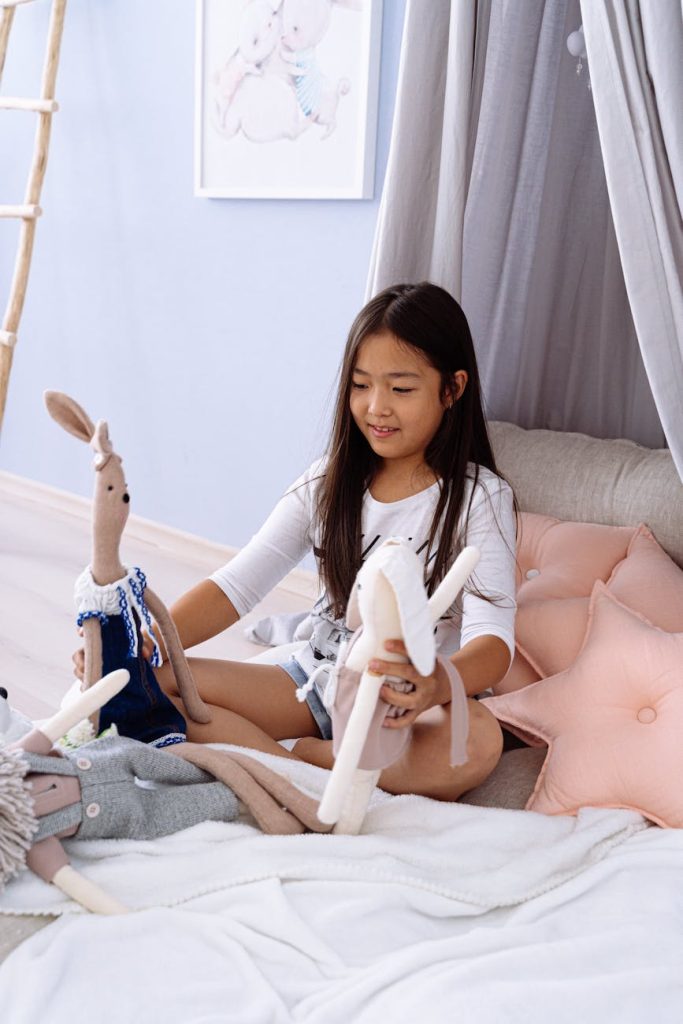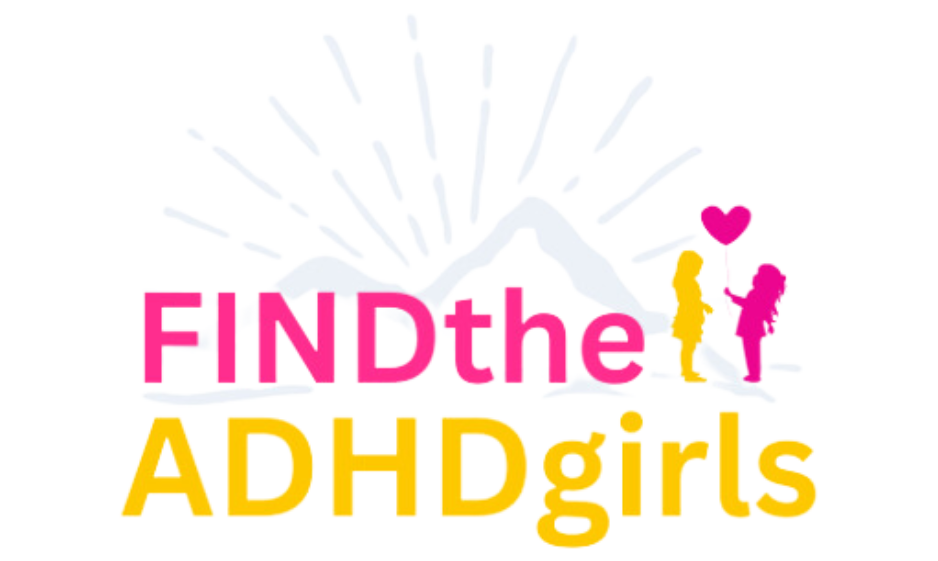Your ADHD daughter is surrounded by dolls and an army of stuffed animals—just like she was 15 minutes ago when you asked her to put her toys away. You close your eyes and take a deep breath. Why is it always like this? Many ADHD girls struggle not because they refuse to listen, but because of executive dysfunction—the brain-based challenges that make it hard to start tasks, stay focused, and follow through.

The thing is, she probably does know better. But knowing better and doing better are two different things.
For many young girls with ADHD, what looks like defiance or laziness is something else entirely: executive dysfunction. Your daughter doesn’t want to let you down. And she doesn’t plan to. But executive dysfunction makes it hard for her to start tasks, stay focused, and follow through.
“When they don’t understand ADHD, parents tend to interpret kids’ misbehavior as if they’re doing it to them.
~Elaine Taylor Klaus, ADHD coach and author
What Is Executive Dysfunction in ADHD Girls
Executive functions are a skill set in the prefrontal cortex that assist with daily tasks, like planning and organization. Think of it like the brain’s air traffic control system.
Some key executive functions:
- Working memory: the ability to hold information in your mind
- Task initiation: get started without stalling or shutting down
- Impulse control: stop and think before speaking or acting
- Emotional regulation: control big emotions without melting down
- Cognitive flexibility: eases transitions, like switching from one activity to another
Executive dysfunction happens when those abilities don’t work as well as they should. For ADHD girls and executive dysfunction, these skills are underdeveloped and lag 2 to 3 years behind other kids their age. It’s not a choice; it’s neurology.
It’s Executive Dysfunction, Not Disobedience
We punish kids for the symptoms of their invisible disabilities.
~Kelly Pickens, ADHD consultant and nurse practitioner
Impairments in executive function can look a lot like disobedience. Let’s take a look at common executive function struggles misinterpreted as misbehavior.
Examples of Executive Dysfunction in Girls with ADHD
- If you say, “Put on your shoes and grab your backpack,” your daughter may arrive with just her shoes on or she arrives barefoot, holding her backpack. She’s not trying to test you, she’s struggling to remember two requests in her mind at the same time.
- When you battle with your daughter to do the simplest task, she’s probably wrestling with task initiation. She just can’t get started, even when she wants to. Doesn’t matter if the task would take 30 seconds; beginning it still seems impossible.
- She keeps interrupting when you’re talking with a friend. You’ve asked her to play quietly or go to her room, but she keeps demanding your attention. She doesn’t mean to be rude or disobey, although it seems that way. It’s her underlying lack of impulse control.
- You ask her to stop playing and come to dinner. All of a sudden, she’s having a meltdown. It’s not to get her way or push your buttons; that’s her emotional dysregulation and impaired cognitive flexibility taking control.

Inconsistency is a Part of ADHD
Your daughter may be able to access a certain skill or ability one day, and unable the next. If you’re thinking, “She can do it when she wants to, and she just doesn’t want to,” you’ll be frustrated. But when you realize inconsistency is a huge part of ADHD, you’ll respond differently. Because the difference in your daughter’s behavior and abilities isn’t manipulation, or even a choice. It’s a matter of dysregulation and executive dysfunction.
This day-to-day inconsistency also appears when you compare her behavior across settings. What teachers see at school can look very different from what you experience at home.
Schools send girls home saying they’re lovely and well-behaved, but parents are saying she’s irritable, impulsive, and melting down.
~Dana Dzamic, ADHD coach, consultant, and author
It can feel like a personal attack when your daughter behaves well at school but acts out at home. However, the reality is that your daughter’s doing the best she can to stay on track at school. She’s performing at the top of her abilities and is exhausted at the end of the school day. That means challenges at home with power struggles and emotional outbursts.
In other words, she’s not saving meltdowns; she’s run out of fuel. And at home with you, she feels safe enough to fall apart.
The Emotional Cost of ADHD Girls and Executive Dysfunction
Inconsistency isn’t only frustrating for you but also for your daughter. She wants to do well and make you proud, but finds it difficult to meet expectations. When she continually misses the mark, it takes a toll on her self-esteem.
Negative Messages and Internal Monologue
Research shows kids with ADHD receive up to 20,000 negative or corrective messages by the time they’re 12. It makes sense when you realize these kids focus best on things that interest them, and sitting still, doing homework, or cleaning their room is usually not among those interests. So when asked to do boring, repetitive, or difficult tasks, they might resist or drift off to something else entirely. They aren’t being willful or lazy; it’s a brain-based difference.
Over time, these chronic corrections become a crushing internal monologue for your daughter. She starts to think, “I’m bad.” I’m lazy.” “I’m stupid.” She may appear defiant or dramatic, but inside she’s ashamed and confused. She doesn’t understand why she keeps getting in trouble for things that are out of her control.

Anxiety, Perfectionism, and Emotional Dysregulation
ADHD girls and executive dysfunction often go hand in hand, making them highly sensitive and prone to becoming anxious perfectionists. They’re not being dramatic; they’re constantly worried about doing their best so they don’t disappoint others.
In other words, when your daughter continually melts down over little things, it’s not because she’s spoiled or seeking attention. She’s overwhelmed. Emotional dysregulation is both a symptom and a result of ADHD girls and executive dysfunction, and these outbursts are from an overwhelmed and under-resourced brain.
How You Can Help
“When you have a parent who understands it themselves… there’s this ability to say let’s figure this out together. I don’t know what this is going to be or how we’re going to do this, but we can do this.”
~Elaine Taylor Klaus, ADHD coach and author
With ADHD kids, normal parenting strategies don’t work—it’s a whole other manual. But with a few ADHD-friendly adjustments, you can support your daughter and help strengthen her executive function skills.
Supporting and Scaffolding Strategies to Build Skills
Shift the Lens
A simple shift in perspective is powerful. Keep in mind, your daughter isn’t giving you a hard time. She’s having a hard time. And she’s really trying. So the next time she’s off-task or doing something other than what she should, reframe it.
- Instead of asking, “Why is she doing this?” ask, “What skill is she missing?”
- Replace the words “She won’t” with “She can’t yet.”
Co-Regulate Before You Educate
Let your daughter know you’re on her team before you correct and process situations with her. Co-regulation isn’t the same as self-regulation; your guidance and understanding can make all the difference. She’s more open to trying when she knows she has your support.
- When upset or “not listening,” help her calm her nervous system first.
- Try: “Let’s take a breath together” or “Want to squeeze my hands while we reset?”
Break It Down
“Clean your room” may seem like a clear instruction, but with ADHD it isn’t. If your daughter doesn’t know where to begin or what steps to take, she’s going to struggle, and may not start. But if you break big tasks into smaller ones it reduces overwhelm and helps her get started and stay on task.
- Give your daughter one simple step at a time. Instead of “Clean your room,” try: “Pick up your books first.” Once she completes that, give her the next task.
- Use visual checklists, timers, or music as prompts.
Name What’s Happening
Your daughter doesn’t understand how her ADHD affects her brain or abilities. So, help her name what’s happening, and let her know that’s normal.
- Frame it as a brain difference, not bad behavior or a character flaw.
- You could say something like, “ADHD makes your brain unique, but it makes some things harder, like paying attention or getting started.”
Celebrate Effort, Not Perfection
It’s important to compare her successes and growth to herself. In other words, don’t compare her abilities to other kids—celebrate her individual progress. Kids with ADHD thrive with meaningful encouragement and truthful compliments.
- “I know it was tough to stop playing. I saw you try, and I appreciate your effort!”
- “You remembered to pack your folder today without a reminder! That’s great progress, and I’m so proud of you!”
Model Repair
You’re only human; even when you know your daughter’s behavior isn’t intentional, you’ll lose your cool sometimes.That’s okay. Show her what to do when that happens.
- Take a deep breath. Say: “I got frustrated. Let’s both try again.”
- She learns emotional regulation by watching you.

Same Story, Different Perspective
Change your expectations of yourself, your family, and your child, and let it be okay.
~Terry Matlen, psychotherapist, ADHD coach, and writer
The next time your daughter melts down about coming to dinner or organizes a tea party instead of feeding the dog, pause and ask yourself, “Is it defiance or ADHD girls and executive dysfunction?”
ADHD girls and executive dysfunction are real, and by shifting your perspective from discipline to understanding, you’re creating a safe space for change.
You don’t have to be a perfect parent. Just an understanding one, supporting her as her brain develops on its own timeline. Always remember: she isn’t giving you a hard time. She’s having a hard time.
For more ADHD-friendly parenting tips, follow FINDtheADHDgirls on Facebook.
About the Author

Alex Alcon
Alex Alcon, RN, Freelance nurse content and copywriter, owner of RN2Pen LLC.

Cynthia Hammer, MSW
Cynthia Hammer, MSW, is an ADHD advocate helping girls get timely diagnoses. She's the founder of FINDtheADHDgirls, Executive Director of Inattentive ADHD Coalition, and author of Living with Inattentive ADHD.
Share via:

